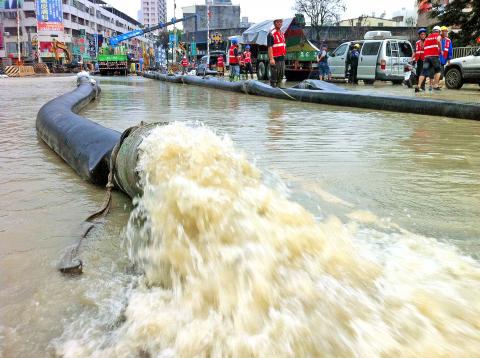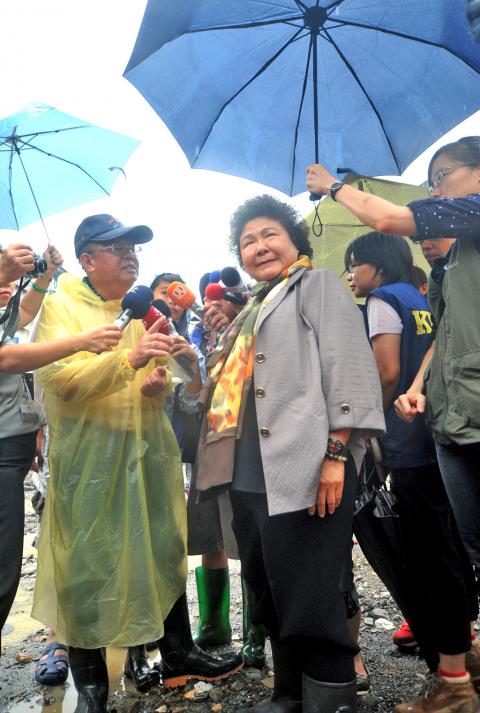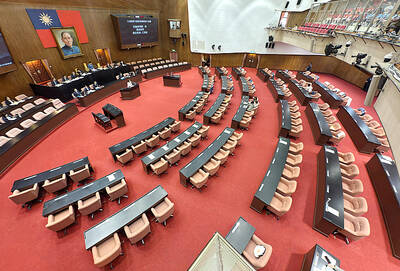Torrential rains that began early yesterday have delayed a plan by the Greater Kaohsiung Government to remove any remaining flammable gas inside a damaged pipeline that is believed to have caused explosions in the city on July 31 and Aug. 1.
According to the Central Weather Bureau, 246mm of rain fell in Kaohsiung’s Ciaotou District (橋頭) between 12am and 12pm yesterday, with more than 220mm falling in both Renwu (仁武) and Dashe (大社) districts.
The heavy rain flooded the streets caved in by the explosions, including the intersection of Kaisyuan and Ersheng roads in Cianjhen District (前鎮), where the pipeline, which is believed to be owned by LCY Chemical Corp (李長榮化學), was found to have been leaking at a section that crossed a drainage culvert prior to the blasts.

Photo: CNA
Prosecutors instructed engineers on Saturday to use a steel pipe to replace a cut-off segment of the pipeline that showed damage in an effort to speed up the removal from the line of flammable gas residues, including propene — which is believed to have caused the blasts.
Last week, prosecutors ordered that the segment of the pipeline be removed for testing to see if the damage had been caused by erosion or by the explosions, which killed 30 people and injured 310.
A plastic pipe was later used to reconnect the gas line, but was unable to withstand pumping pressure. The plastic pipe was originally set to be replaced today with a steel segment, but the work was delayed by flooding.

Photo: Huang Chih-yuan, Taipei Times
The Kaohsiung Environmental Protection Agency said the replacement work could not begin until the water level drops by at least 1m.
After the remaining propene, also known as propylene, in the pipe is cleared, investigators are to excavate the culvert to examine whether the pipeline suspected to be the source of the gas that led to the blasts was laid before or after the culvert’s construction, the Kaohsiung District Prosecutors’ Office said.
Underground pipelines should be packed within soil or other material and should not be exposed to air — as they were at the blast site at the point where they crossed the culvert — which can overly expose pipelines to air and moisture, leading to corrosion.
If the culvert in question is found to have been built after the pipeline’s installation, the city government might be held responsible for improper construction.
Meanwhile, Executive Yuan spokesperson Sun Lih-chyun (孫立群) said that Premier Jiang Yi-huah (江宜樺) has ordered preparations for a meeting with Kaohsiung Mayor Chen Chu (陳菊) to discuss enhancing safety in the petrochemical industry, adding that a date has not yet been decided for the two to meet.
Chen, a member of the Democratic Progressive Party, said on Saturday that she would like to meet with Jiang this week to talk about the hierarchy of responsibility between the central government and local authorities for regulating undergrounds pipelines owned by petrochemical companies in Kaohsiung.
However, Chen said yesterday that the situation at the disaster zone has been exacerbated by the rain in Kaohsiung and that she will wait until the situation improves before traveling to Taipei for a meeting with Jiang.

CROSS-STRAIT COLLABORATION: The new KMT chairwoman expressed interest in meeting the Chinese president from the start, but she’ll have to pay to get in Beijing allegedly agreed to let Chinese Nationalist Party (KMT) Chairwoman Cheng Li-wun (鄭麗文) meet with Chinese President Xi Jinping (習近平) around the Lunar New Year holiday next year on three conditions, including that the KMT block Taiwan’s arms purchases, a source said yesterday. Cheng has expressed interest in meeting Xi since she won the KMT’s chairmanship election in October. A source, speaking on condition of anonymity, said a consensus on a meeting was allegedly reached after two KMT vice chairmen visited China’s Taiwan Affairs Office Director Song Tao (宋濤) in China last month. Beijing allegedly gave the KMT three conditions it had to

‘BALANCE OF POWER’: Hegseth said that the US did not want to ‘strangle’ China, but to ensure that none of Washington’s allies would be vulnerable to military aggression Washington has no intention of changing the “status quo” in the Taiwan Strait, US Secretary of Defense Pete Hegseth said on Saturday, adding that one of the US military’s main priorities is to deter China “through strength, not through confrontation.” Speaking at the annual Reagan National Defense Forum in Simi Valley, California, Hegseth outlined the US Department of Defense’s priorities under US President Donald Trump. “First, defending the US homeland and our hemisphere. Second, deterring China through strength, not confrontation. Third, increased burden sharing for us, allies and partners. And fourth, supercharging the US defense industrial base,” he said. US-China relations under

The Chien Feng IV (勁蜂, Mighty Hornet) loitering munition is on track to enter flight tests next month in connection with potential adoption by Taiwanese and US armed forces, a government source said yesterday. The kamikaze drone, which boasts a range of 1,000km, debuted at the Taipei Aerospace and Defense Technology Exhibition in September, the official said on condition of anonymity. The Chungshan Institute of Science and Technology and US-based Kratos Defense jointly developed the platform by leveraging the engine and airframe of the latter’s MQM-178 Firejet target drone, they said. The uncrewed aerial vehicle is designed to utilize an artificial intelligence computer

The Chinese Nationalist Party (KMT) caucus yesterday decided to shelve proposed legislation that would give elected officials full control over their stipends, saying it would wait for a consensus to be reached before acting. KMT Legislator Chen Yu-jen (陳玉珍) last week proposed amendments to the Organic Act of the Legislative Yuan (立法院組織法) and the Regulations on Allowances for Elected Representatives and Subsidies for Village Chiefs (地方民意代表費用支給及村里長事務補助費補助條例), which would give legislators and councilors the freedom to use their allowances without providing invoices for reimbursement. The proposal immediately drew criticism, amid reports that several legislators face possible charges of embezzling fees intended to pay